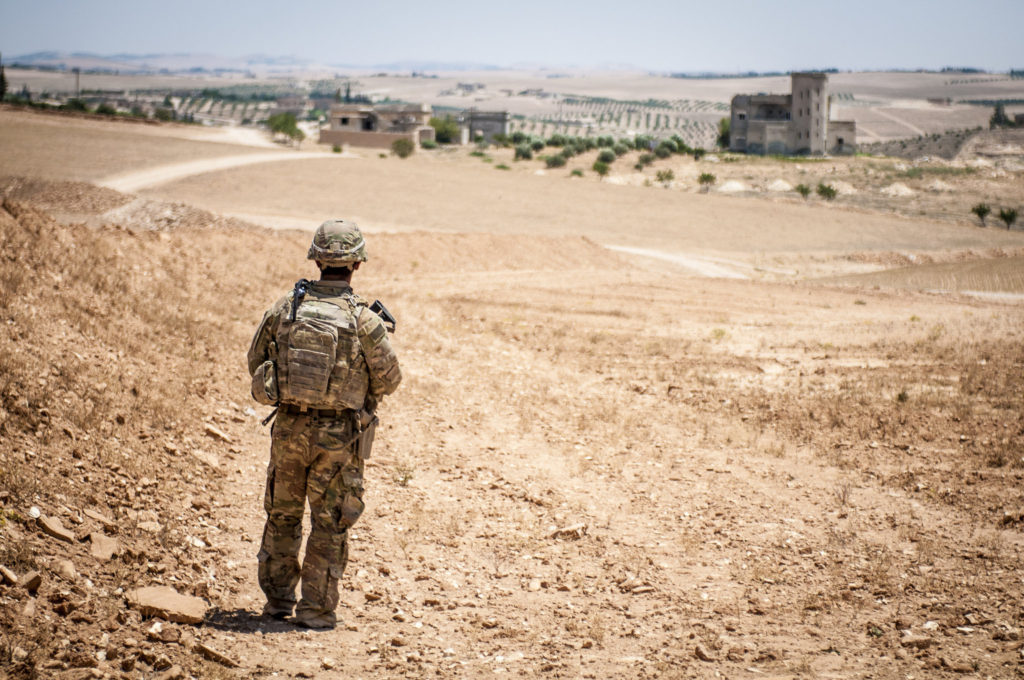Less than three months after President Donald Trump declared victory in the war against the Islamic State in Iraq and Syria (ISIS), he has now reversed the U.S. military’s course back into the war-torn region to “ensure stability and prevent the return” of the Islamic State’s jihadist militant group in Syria. Trump was even praised by a bipartisan, bicameral contingent of lawmakers in Washington for his decision.
Before Christmas though, Trump promised to end the fight against the Islamic State and bring American troops home, even tweeting, “After historic victories against ISIS, it’s time to bring our great young people home!” In February, Trump faced the tough decision whether to withdraw America’s approximately 2,000 troops from Syria by April 30, just as ISIS was retreating towards the Iraqi border.
Vice President Mike Pence declared not long afterwards, “ISIS has been defeated,” hours after the terrorist group claimed responsibility for an attack in Syria that killed four U.S. troops. “The caliphate has crumbled and ISIS has been defeated,” he added.
While “defeated,” ISIS is yet unrelenting.
During a procession of shuttered, bloodied jihadists fleeing their last area of occupation in eastern Syria, AFP reported that combatants still widely praised the emergence of the fundamentalist state, vowing their return to “seek vengeance.”
Outside of the besieged village of Bāghūz in the Middle Euphrates River Valley near the Iraqi border, a group of 10 women arriving at the screening point manned by the Kurdish militia-led Syrian Democratic Forces (SDF) swarmed reporters, throwing rocks and shouting, “The Islamic State is here to stay!”
Reportedly, there is a “deeper” commitment brewing amongst the theocratic, philosophical underpinnings of the Islamic State. Referred to as “cubs of the caliphate,” boys raised under terrorist rule and trained to fight and sacrifice their lives from a young age are the reason the group will survive and may mount its return, some Iraqi women say.
“The caliphate will not end, because it has been ingrained in the hearts and brains of the newborns and the little ones,” says one woman about the terrorist network, which has sold thousands of young girls and women into slavery, even using them as human shields.
One Damascus woman speaking from behind a veil said about the future of the state, “We will seek vengeance, there will be blood up to your knees.”
The U.S. general leading the war against the Islamic State also has reservations with the commander in chief’s decision to pull out of Syria, warning that the terror group was “far from defeated.” Trump’s announcement of troop withdrawal was even the catalyst for Defense Secretary Jim Mattis to resign from his post.
“[The caliphate] still has leaders, still has fighters, it still has facilitators, it still has resources, so our continued military pressure is necessary to continue to go after that network,” said General Joseph Votel in an interview, the top American general in the Middle East. He also explained that U.S.-backed forces on the ground were not ready to handle the threat of ISIS on their own.
Ordered by President Trump, the U.S. will remain in the region to “protect the gains” made by the 79-nation coalition fight to rid the world of ISIS.
In a one-sentence statement from White House Press Secretary Sarah Huckabee Sanders, “A small peace keeping group of about 200 will remain in Syria for period of time.” U.S. military officials have since confirmed the residual force will double to 400 and that they will be split between northeastern Syria and the southern part of the country.
While the U.S. military oversees the SDF clearing out the rest of Bāghūz and patrols the surrounding areas, ISIS fighters may retreat to Afghanistan.
American officials are consulting with military allies on a plan to cut American troop strength in the Central Asian country by half – from approximately 14,000 to 7,000 – withdrawing entirely by 2022. Al-Qaeda, ISIS, and other extremist groups could find safer harbor in Afghanistan to organize far-reaching terrorist attacks, eventually leading to the U.S. engaging in counter-terrorism operations under much more difficult geographical conditions.
Moreover, the Islamic State of Iraq and the Levant – Khorasan Province (ISIS-K) has been actively recruiting from schools and mosques in Afghanistan and has been asking new recruits for their social media contacts and phone numbers of people they know in the U.S., according to intelligence reports.
U.S. officials have revealed that ISIS fighters have been said to have a “mandate to attack across the Atlantic.”

